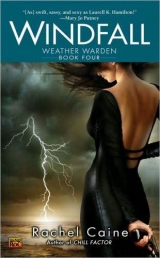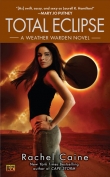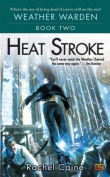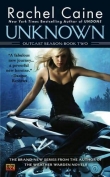
Текст книги "Windfall"
Автор книги: Rachel Caine
Соавторы: Rachel Caine
Жанр:
Городское фэнтези
сообщить о нарушении
Текущая страница: 17 (всего у книги 22 страниц)
Any second now, I was going to lose control. I reeled unsteadily and ended up sitting on the edge of the bed. It gave with an ease and firmness that spoke of memory foam somewhere in the construction. Sarah had gone all out to make me happy. Except that she’d done the one thing guaranteed to destroy my life.
Maybe the life of every person on the planet, if I stretched things out to their logical conclusion.
I put my head down and forced myself to focus, to be still and calm.
“What did I do?” she asked in a meek, little-girl voice. “Jo, just tell me, what did I do?”
I couldn’t exactly explain that she’d just tossed away the love of my life in a garbage truck. Oh God, David…This was surreal, it was so ridiculous.
Sarah, of course, came to exactly the wrong conclusion. She clapped both hands over her mouth, tears forming in her eyes, and then ventured, “Oh God, Jo… Was it drugs? Are you on drugs? Did I throw away your stash?”
I laughed. I couldn’t help it. It came out as a kind of mad, despairing burst of sound, and I covered my face with my hands and stood there for a moment, shaking. Dragging in one gulp of air after another.
Sarah’s hand fell on my shoulder, warm but tentative.
“I screwed up,” she said. “I get it. I’m sorry. Look, I’ll do whatever I have to do to get it back for you. I’m sorry, believe me, I thought—we thought we were doing something good for you—”
Oh yeah, it was good. I had an apartment full of furniture I didn’t want, the Djinn were at war, Wardens were dying, and my boyfriend had gone out with the trash.
I stood up and walked to the closet.
“Jo? Where—where are you going?”
I didn’t even look back as I pulled out industrial-strength jeans and tossed my hiking boots onto the brand-new bed.
“We,” I corrected her. “We are going dump-diving. Get dressed.”
I don’t know if you’ve ever been to a big-city dump at twilight, but it’s definitely an adventure. I’d come prepared for the worst—my trashed-out blue jeans, thick, long-sleeved tee, hiking boots, hair twisted up in a knot, face mask and gloves. Sarah wore brand-new jeans, a delicate pink top, and old tennis shoes. After some top-of-my-voice persuasion, she’d decided against the new, expensive footwear.
At least the rain had stopped. If it had been storming, I don’t think even I could have bullied her into it.
Armed with the name of the furniture company, we arrived at the dump an hour before closing, and tracked the delivery to a huge pit that was earmarked for furniture, appliances, and other large junk. Trucks were still arriving. As we pulled up in the minivan, a commercial truck backed up to the dropoff, sounded a beeping alarm, and tilted its bed slowly into the air.
An avalanche of twisted metal, old, splintered furniture, and busted TVs joined the mass grave.
Sarah was fidgeting before we’d parked the mommy-van. “Oh, my God! Jo, it smellsout here!”
“Yes,” I said, and handed her a face mask and gloves. “You’re sure you left it in the drawer of the nightstand?”
“Yes, why?”
“Because otherwise we’re in the other pit. The one with the biodegradable garbage like rotten food and old diapers. And believe me, you’ll like this better.”
She shuddered, pinching her nose shut. “I’m dure.” She sounded like a wacky 1940s comedienne. “Thid id awful!”
“Yeah, no shit. Watch out for rats.”
“Rats?” she squeaked.
“Rats.” I’d had a friend once whose boss had sent her to the dump to retrieve legal papers from a trash bag. I decided not to tell Sarah about the scary cockroaches. “Take the flashlight. It may be dark down there.”
“Dark?” Sarah’s commitment to make things right was rapidly eroding and gaining qualifiers like so long as it’s convenientand so long as I don’t get my hands dirty.
I ignored her, popped the door, and got out. The newer arrivals seemed to be dumped toward the right-hand side, and I scanned the mass of crap to try to spot something familiar. It was like trying to identify pieces of your life after a tornado, the familiar pureed into rubbish. I gulped down a choking sense of panic and kept systematically looking. According to the map they’d given me, the furniture company had dumped in grid E-7. Of course, a map in a dump lacked landmarks, but since the cheerful, flannel-clad guy on duty had said they were currently dumping in E-12, I had a pretty good general range. I scanned junk, which all looked, well, the same, and finally caught a flash of white among all of the gray and brown.
I jumped down from the packed earth ledge into the pit, braced myself with one hand on the wall, and started carefully picking my way over the junk pile. It was dangerous. Sharp corners and nails and jagged metal. Glass. Broken mirrors.
The place was a tetanus shot waiting to happen.
Even though I was completely focused on the mission at hand, my eyes kept focusing on interesting bits of garbage. A broken, tiger-maple chest that looked antique. A massive, carved teak table that was magnificently in one piece and probably would be until the sun consumed the earth, as hard as teak was—I couldn’t believe somebody had actually moved it in the first place. It made me exhausted just looking at it.
I tripped over a big, dented brass pot and nearly fell into a steel cabinet, but managed to brace myself. I looked over my shoulder to make sure Sarah was okay.
She was picking her way slowly behind me, testing every step twice before putting her weight on anything, one hand always outstretched to catch herself.
The other held a flashlight in a death grip, not that she really needed it yet.
The face mask and cherry pink top made quite a fashion statement.
I climbed a small, slippery hill of appliances—somebody had thrown out a gigantic Maytag washer—and saw something that might have been the leg of a French Provincial nightstand. I reached for it and yanked; it was a slender, delicately curved leg, freshly broken off, with faded gilt on white.
Definitely from Sarah’s room. Or, okay, somebody else with the bad taste to have French Provincial bedroom furniture. But I doubted there’d be two of us contributing to the city dump on the same afternoon.
“It’s somewhere around here!” I yelled. She nodded breathlessly and climbed up to join me. She found the first piece of my bedroom suite—the headboard—and yelled in triumph as if she’d discovered King Tut’s tomb. I scrambled over to haul it to the side. Underneath was a broken drawer from my dresser. Empty.
We worked silently, panting, sweating, as night brushed closer and darker. Alarms sounded the everybody out, along with loudspeaker announcements. Floodlights snapped on, harsh and white, throwing everything into alien relief.
“We’ll never find it!” Sarah wailed. She straightened up, yanked down her mask, and wiped her streaming forehead with the back of her forearm. Dirt smudged her face in a circle around the mask, and her normally cute hair was plastered lankly around her skull. Her desire to please had ebbed into pure, disgusted exhaustion. “Dammit, Jo, just forget about it, would you? What was it, cocaine? Jesus! Bill me for it!”
I yanked a shattered television aside—yes, that was mine; I remembered it with a lurch of affection because I’d bought that crappy little thing with my own hard-earned money at a yard sale—and uncovered another dresser drawer. Blank, except for a coating of liner paper. I kicked it out of the way with unnecessary violence.
“It wasn’t cocaine, you idiot!” I yelled back, and felt my hands curling into fists at my sides. “Maybe that’s your lifestyle of the rich and blameless, but—”
“Hey! I’m hip-deep in garbage trying to help you, you know—”
“Excuse me, but you showed up begging mefor help, if I remember! And all you’ve done is cost me money and fuck up my life!”
I didn’t mean to say that… exactly. But it was true. I watched Sarah’s flushed face drain of color and bit back an impulse to apologize.
“Fine,” she said, with unnatural control. “I thought I was doing something nice for you, Joanne. I took the little bit of money I got from my deadbeat bastard of an abusive husband and I spent it on you to make up for imposing on you. I’m sorry that it interfered with your stupid bottle collection!”
She turned and scrambled away, graceless and angry.
“Hey!” I yelled.
“Fuck off!” she yelled back, and kept going. “Find it yourself!”
Fine. Whatever. My back hurt, my head ached, I was sweaty and exhausted and I could hear—and feel—a black ugly mutter of thunder out to sea. The vultures were coming home to roost.
And I had to find David’s bottle. I just had to. It couldn’t end this way.
I uncovered the shattered shell of my dresser. It was too big to move. I cried for a little while, tears soaking into the gauze mask, and then grabbed hold and kicked the damn thing with my hiking boots until it splintered into pieces small enough to drag out of the way.
As the last one came free, I saw the nightstand, and it was all in one piece.
I gave a wordless, breathless yell, and hauled it out of the heap of junk it was buried in, leaned it against a rusted-out harvest gold washing machine, and slowly opened the drawer.
It was full of stuff. Old lotion bottles with half a handful left in each one.
My out-of-date sale catalogs.
A zippered bag full of foam cushioning.
I grabbed it, hugged it like a little girl reunited with her favorite stuffed animal, and unzipped it with shaking gloved fingers.
There was nothing inside.
Nothing.
I screamed, bit my lip, and forced myself to do things slowly. One piece at a time, taken out, examined, and tossed aside. Foam padding last.
It wasn’t there.
David’s bottle wasn’t fucking there.
In the dark, under the glare of the floodlights, I saw the cold green gleam of eyes out in the dark. Rats? Cats? They winked on and off in the shadows, too cautious to come near me, but too close for comfort.
One of those legendary giant cockroaches crawled out of the heap and began trundling like a shiny brown bus over heaps of metal.
The bottle wasn’t in the drawer, and it wasn’t in the bag where it was supposed to be. Night was falling. I couldn’t do this once the floodlights shut off, and tomorrow another layer of junk would arrive and bury any chance I had…
I had to do it. “David,” I said, and closed my eyes. “David, come to me. David, come to me. David, come to me.” Rule of three. Even if he’d wanted to, he couldn’t refuse to obey that, not even as an Ifrit, so long as he was bound to a bottle. I had to know if the bottle was intact, at least. If David was still bound.
Out in the shadows, something moved. It was unsettlingly like that giant cockroach, the way it caught the floodlights in shiny angles and sharp points.
Skin like coal. Nothing human about it.
“David?” I whispered.
The Ifrit stood there, motionless. I got nothing from it. No sense of connection, no sense of it even existing beyond the evidence of my eyes.
If he’d come when I called, he was still bound to the bottle. Worst possible news. I felt tears burning in my eyes again. “God, no. David, I’m so sorry. I’m going to find you. There’s got to be a way to make this right, to make this—”
He moved. Quicker than a Djinn, scarier, he was touching-close in less time than it took my nerves to fire an impulse to scream. His black-clawed hands slashed through me and plunged into…
… into that golden reservoir of power that Lewis had given me.
Why? How?Ifrits couldn’t feed on humans, not even Wardens, they couldn’t…
He was. “No!” I screamed, and tried to back up. I tripped and went down, felt something slash my shoulder, took a sharp angle hard in the back. The impact stunned the breath out of me and made me go momentarily hazy.
He didn’t let go. When I opened my eyes he was crouched on top of me; black edges and angles, hunger and an absence of everything I knew as human, a Djinn emptied of all that made him part of the world…
And then, he flickered and became flesh, bone, blood, heartbeat, real.Djinn in human form. Copper-bright hair, burning eyes, skin like burnished gold.
“Oh, God,” he murmured, and staggered back from me, clothes forming around him—blue jeans, open flannel shirt, his olive drab coat. “I didn’t mean to—Jo—”
“Where are you?” It was all I could do to form the words; he’d taken so much energy from me that I felt oddly slow, as if there wasn’t enough current left in my cells to drive the process of life and thought again. “Tell me.”
He reached down and lifted me in his arms, buried his face in the curve of my neck. He felt blazing hot, powered by my stolen life. I felt his agonized scream shiver through me. I stilled him by clumsily putting a hand on his face. “David, tell me where you are.”
He was weeping. Weeping.Human tears from inhuman eyes, a kind of despair I’d never seen in him before, a trapped and hunted fury. “I can’t,” he said. “I’m sorry. I’m so sorry. I told you to stop me, I told you—”
“Hey! Put her down!”
I blinked and saw the dump whirl around me as David turned, still holding me.
Sarah was standing about ten feet away, holding—what the hell was that? A frying pan? Yep, a huge iron skillet. It must have weighed twenty pounds. Her arms were trembling with the effort of keeping it held at threat level.
“I mean it!” she yelled, and took another step toward us. “Put my sister down right nowor it’s batter up!”
“It’s okay,” I said, and felt the world start to gray out. I held on with an effort. “Sarah, no. This is David.”
She looked confused. Her knuckles whitened around the skillet.
“Boyfriend,” I managed.
“Oh.” She swallowed, dropped the skillet with a clang of metal, and scrubbed her fingers against her filthy blue jeans. “Um, sorry. But—Jo? Are you okay?”
“She fell,” David said. He sounded shaken. When I looked up at him I saw that he’d formed glasses, and his eyes were fading to human brown. He still looked way too gorgeous to be real, but maybe that was just my prejudice. “I’ll carry her out.”
“Sorry,” I whispered, and put my arms around his neck. His strength and warmth folded around me, sheltering and protecting. “I love you. I love you. I love you.”
“I know.” He touched his lips to my hair, then my forehead. “I wish you didn’t. I wish I could make this—stop. If I didn’t love you, wasn’t part of you, I couldn’t do this to you…”
“David, tell me where you are!”
He tried to tell me. His mouth opened, but nothing came out. He shook his head in frustration and tightened his hold on me as he made his way over the mountains of sharp metal and broken furniture, heading for the metal steps back up to the parking lot.
“Please. No, wait—I need to get your bottle, we can’t just leave it here—David, I’m orderingyou, tell me where it is!”
He brushed my lips with a kiss, something gentle and very sad. “It won’t work,” he said. “You’re not my master anymore.”
And that was when I realized that I didn’t feel the draw anymore—the connection of master to Djinn.
Somebody else had his bottle.
“Who—”
Overhead, black clouds rumbled. I felt a breeze ruffle my hair. David moved faster, effortlessly graceful. No longer trying to look all that human. I remembered how he’d been on the overpass, all that unnatural balance and weird, fey control. He took the metal steps two at a time.
Sarah was still struggling along in his wake.
David carried me to the minivan and put me in the passenger seat, one hand dragging warm down the curve of my cheek as he settled my head against the cushions. A flash of lightning lit him blue on one side while the floodlights washed him white on the other.
“Don’t look for me,” he said. “It’s better that you don’t. You’re not safe with me now.”
He kissed me. Baby-soft lips, damp and silken and hot. I tasted peaches and cinnamon and power.
When he tried to pull back, I held on, holding the kiss, deepening it, demanding. Drinking a little bit of my power back from him.
Enough to make me a Warden again, even though not much of one.
He faded and cooled as I did it, but not quite enough to slide back into Ifrit-state. But he would. As the power faded, he’d revert.
But for now, at least, we were balanced. The connection—and it was a different one than we’d had as master and Djinn—worked both ways.
“You didn’t have to answer when I called,” I said, and touched the side of his face, then tangled my hands in the soft strands of his hair. “If I’m not your master—”
“I’ll always be yours,” he interrupted. “Always. The bottle doesn’t matter.” His forehead pressed against mine, and his breath pulsed warm on my skin. “Don’t you understand that yet?”
Another flash of lightning blinded me. When I opened my eyes, my hands were empty, and David was gone. I didn’t cry. I felt too numbed and empty to cry.
Sarah lunged over the top of the metal steps from the junkpile, panting, flushed, thoroughly filthy. She grabbed the open door and looked inside, then met my eyes. Hers were anime-wide.
“Where’d he come from? Wait… where’d he go?”
I just shook my head. Sarah stared at me for a long, considered second, and then shut the door and climbed into the driver’s seat. The engine started with a roar, and she began piloting the Good Ship Minivan out of the dump.
“He’s a Djinn,” I said wearily, and leaned my head against the glass. “Magic’s real. I control the weather. He’s an immortal creature made out of fire, and he grants wishes. I was getting around to telling you.”
Silence. Sarah hit the brakes hard enough to jerk, and for a few long seconds we just sat there, idling, until the first fat drops of rain began pelting the van with hard, resonant thumps.
“Well,” she finally said, “at least he’s cute. Are you insane?”
I sighed. “Oh, I sowish I was.”
We drove home. I felt exhausted and sick and sore, and refused Sarah’s multiple offers of visits to the local emergency room or mental health center, no matter how rich, cute, and single the doctors might be. I showered away the dump under the new high-pressure massaging bath nozzle—not all of Sarah’s upgrades were objectionable—and crawled into my brand-new bed, too tired to wonder what I was going to do in the morning about all my various enemies, crises, and wars.
David was, at least, not buried under half a ton of garbage at the dump, or at least I didn’t think he was. That was about as much of a victory as I could aspire to for one day.
In retrospect, if I’d had half a brain in my head, I’d have never shut my eyes.
Interlude
As the storm destroys the island that men called Atlantis, as it strips it bare and devours every fragment of life before sinking the bare rocks under the waves—something strange happens. The explosion of death-energy from the destruction is so huge that, to balance the scales, five hundred Djinn snap into existence, each holding some small measure of the life of that lost, beautiful land. Lost and alone, newborn.
Powerful, and afraid.
The storm doesn’t see them as fuel for its fires, and turns north, toward a rich, green land full of energy, full of life, full of fragile things that it can grind apart in its fury.
And this is when it becomes my story, and my mistake. I can’t stop it. The Djinn can’t stop it, even with the addition of the Five Hundred; the storm is a natural thing, and we can’t fight manifestations of the Mother nearly so well as we fight each other, or things in the world of man.
The end of the world is on us. We argue, the Djinn. Some of us try to turn the storm aside, but it’s too much for us.
I realize there is no way for Djinn to help mankind, and no way for mankind to save itself, without making an irrevocable choice.
So I pull from the Mother and give power to humans to make them Wardens. And I give them the means to enslave the Djinn. By binding the Djinn, the Wardens can direct us, and we can tap the power pooled inside of humanity and amplify it, creating a web of intent and potential large enough to contain and weaken the storm.
The moment when we join together, humans and Djinn, and defeat the storm at the end of the world… it is, for a moment, the unity of all things. A perfect peace. But perfect peace can’t last, and when it comes time for the Wardens to give up the power I’ve granted them over the Djinn, they refuse.
Should have seen that coming.
Ashan and the others are breaking the deal I made, all those millennia ago.
They’re doing what I never had the courage to do: They’re taking back their freedom.
And I don’t blame them. I blame myself.
It’s time for things to be clean again. Scrubbed raw, like the rocks of Atlantis. Maybe what comes out of this will be better. I’ve wanted freedom for the Djinn for a long time, but I’ve never actually been faced with seeing it happen before. Choosing it.
But it’s the right choice.
If David were here, he’d tell me I’m crazy.
But he’s not here. For the first time in my life, human or Djinn, he’s not here to help me. I’m at the end of the road, and it’s all dark out there, and I don’t know that there’s any right answer to anything, in the end.
Only choices.
So I think I’ll sit here on the beach, with the waves spraying the sky, watching as that long-ago storm swirls itself back into life again, finishing what it started. The Wardens have been fighting this same storm for thousands of years, whether they know it or not. I always feel something about it, something familiar, when it manages to put on its cloak of clouds and come back for another round.
I can’t stop it alone. Neither can the Wardens. And the Djinn… the Djinn have had enough of sacrifice.
I watch as the storm’s heart turns black and furious, and I wish it didn’t have to end this way.
But I don’t know of any other way for it to happen.








